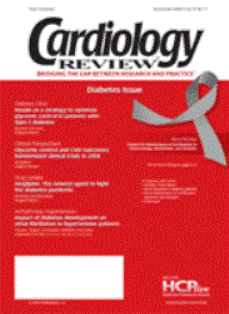Sugar and spice is not always nice
November is American Diabetes Month, and given the widespread and increasing prevalence of diabetes and its close interrelationship with cardiovascular disease, we have dedicated this issue to diabetes and its management. The prevalence of diabetes, particularly type 2 diabetes, is increasing at an alarming rate worldwide. Among all patients, less than 10% have type 1 diabetes, whereas more than 90% have type 2 diabetes. Within the next 3 decades, the number of diabetic individuals is projected to more than double. In the United States, approximately 23.6 million people (8%) have diabetes and another 51 million are estimated to have impaired glucose tolerance, impaired fasting glucose, or both.
Diabetes increases the incidence of atherosclerosis and accelerates its clinical course, causing obstruction primarily in the coronary arteries, lower extremities, and extracranial carotid arteries. Currently, diabetes is considered a cardiovascular risk equivalent, and data suggest that patients with diabetes have a significantly increased risk of experiencing a myocardial infarction (MI). In fact, the risk of a first MI in diabetic patients is as high as in nondiabetic individuals who have had an MI. The risk of asymptomatic myocardial ischemia is also considerably increased in diabetic subjects.
Cardiology Review
In this issue of , Drs Brunton and Levy discuss insulin as a strategy to optimize glycemic control in patients with type 2 diabetes, suggesting insulin should be initiated early and built into a comprehensive treatment program that includes addressing weight, exercise, blood pressure, and cholesterol levels. Dr Hoogwerf, a well-known diabetologist, provides an overview of the recent clinical trials on glucose-lowering therapies, including UKPDS, ACCORD, ADVANCE, and VADT, and discusses their key findings and clinical implications. Dr Aksnes and associates discuss the impact of diabetes development on atrial fibrillation (AF) in hypertensive patients. They report that patients with new-onset diabetes develop more AF than those without diabetes. It appears that clustering of risk factors or the presence of dysglycemia may make the heart particularly vulnerable to arrhythmias.
This month, we also bring you 2 Web exclusive articles at
. Dr Hoogwerf discusses renin-angiotensin aldosterone system blockade in diabetic patients, suggesting that direct renin inhibition has a favorable effect on urinary albumin excretion. The second report is by Dr Mellbin and associates, who conducted a post hoc analysis of the DIGAMI 2 trial. The authors suggest that chronic insulin treatment may be associated with an increased risk of MI or stroke. Dr Hoogwerf points out the potential flaws of this analysis, stating the hazard seen with insulin
therapy may be spurious.
Cardiology Review
We hope that this issue of and the associated Web features will help clinicians understand the clinical implications of recent clinical trial data for the optimal management of diabetes.
